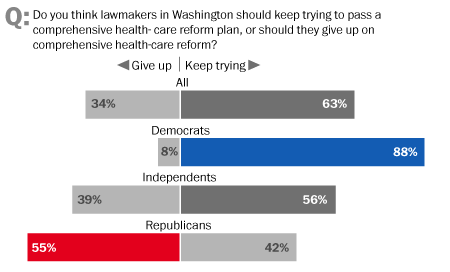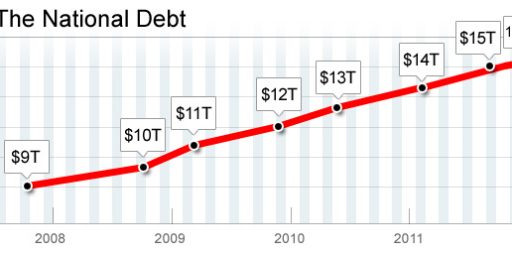Bipartisanship and Other Magic Ponies
WaPo’s Jon Cohen thinks the “bipartisanship” tack that President Obama is taking to fight back against recent Republican gains could work.
Nearly six in 10 in the new poll say the Republicans aren’t doing enough to forge compromise with President Obama on important issues; more than four in 10 see Obama as doing too little to get GOP support. Among independents, 56 percent see the Republicans in Congress as too unbending and 50 percent say so of the president; 28 percent of independents say both sides are doing too little to find agreement.
As party leaders tussle over the proposed bipartisan health care summit, nearly two-thirds of Americans say they want Congress to keep working to pass comprehensive health-care reform. Democrats overwhelmingly support continued action on this front, as do 56 percent of independents and 42 percent of Republicans.
The problem with this is two-fold, however. First, people generally seem to think that, if politicians would just work together, they’d not only get things done but they’d miraculously be just the policies that they themselves prefer. That’s not the reality. Second, while a striking number of Republicans also share that sentiment, a majority correctly understands that any bill they could pass with a Democratic majority and a Democratic president would be one they’d very much dislike. So giving up — which translates into obstructionism — is the better course.
Personally, I’d like to see some reforms passed on things like portability and interstate competition. These measures could win overwhelming support from both parties. But, for a variety of reasons, they’re unlikely to happen absent a comprehensive bill. And a comprehensive bill is unlikely.
Regardless, Mark Knoller‘s right here:
He’s appealing for a spirit of bipartisanship – urging Democrats and Republicans alike “to put aside matters of party for the good of the country.”
It’s a familiar refrain from U.S. presidents who can’t get their way in Congress.
“We must put aside our political differences if we’re ever to set our economy to rights,” said President Reagan in 1982.
“It is time to put aside partisan rivalries and work together for our nation’s future,” said President Reagan in 1987 in trying to get Congress to enact deficit reduction
“We must put aside partisanship for the sake of our nation,” said the first President Bush in 1990 in appealing for congressional cooperation on the budget.
“We must now put aside bitterness and rancor, move beyond partisanship,” urged President Clinton in 1993 in trying to get Congress to pass his economic plan.
What these presidential appeals for bipartisanship always mean is: do it my way.
Because, of course, if the other party were only reasonable, that’s what they’d do!
UPDATE: John Cole isn’t buying Knoller’s analysis.
Missing from this “analysis” from Knoller is the fact that but for bizarre Senate rules, a vast MAJORITY of the House and Senate want what the President wants. Missing from this analysis is the fact that the GOP is not acting as an honest partner and is voting as a block, providing not one vote. Missing from this analysis is the fact that the WH has made so many concessions to the Republicans and included so many of their demands into legislation that the left wing is pissed, and the GOP turned around and voted against it anyway.
He doesn’t want them to surrender. Hell, if they would just vote for bills that they co-signed, he’d be happy.
Nothing is going to change until our pudgy, well-paid, lazy stenographer class is as desperate as the rest of the American people. If Mark Knoller and Michael Gerson had no health care, made 17k a year, and had a pre-existing condition, I bet they’d think differently about things. But then again, that is suggesting he even thought before barfing up this piece.
But none of that contradicts what Knoller is saying. Obviously, if the Senate worked on a purely majoritarian basis, presidents wouldn’t need bipartisan cooperation when their party controlled Congress. But, since it doesn’t, they do. And, while all the presidents above — including Obama — naturally offered to make compromises, Knoller’s right: Calls for “cooperation” are almost invariably pleas for the other side to cave.







Is the electorate at large really that childish or is that just the impression you’d receive from highly partisan officeholders? Another possibility is that people believe that measures with genuine bipartisan support are more likely to be workable and durable.
There is evidence to support that. The original Social Security Act was passed by majorities of both parties. The amendment to that act that created Medicare was also passed by majorities of both parties.
Doesn’t it stand to reason? Things that have broad support among the American people are more likely to be supported over the long run?
Ten votes in the Senate and five in the House are vast majorities?
James, that is nonsense. They won’t even vote in favor of legislation they have co-signed. They won’t vote for things they have spent years supporting. Pointing that out and trying to shame them into being honest players is not calling for surrender, and you are just providing rhetorical cover for behavior that is inexcusable.
Even leading Republicans have admitted that the current system is dysfunctional. Right now they have a reform bill sitting out there with basically every line item that they want in it and some items the other side wants… a compromise bill. Despite that, despite the fact that there has been numerous outreaches to them, Republicans are stating that it isn’t good enough and that the whole process needs to be started over from this point and are willing to vote as a block to get that. It appears that Republicans would rather have the dysfunctional system than attempt to correct an admitted problem.
To me this makes no sense, unless they are more concerned with embarrassing the Majority Party than running the nation.
It also shows to me quite clearly the “I’ve got mine, screw you mentality” of the current Republican Party.
Are you high? All he wants is an opposition that is bargaining in good faith and if that what your saying the GOP has been doing on health care your delusional. I expect politics, I expects opposition, but god the Dems at least let Bush’s disastrous tax cuts come to the freaking floor.
It does .. it only takes 51 votes to pass a bill. Getting to the floor to vote now, apparently. takes 60.
This is apples to oranges, in those days republicans had a progressive wing and Democrats had a huge conservative wing. Dave this observation either betrays your total lace of understanding of historical context or your being obtuse. Further more interest group lobbying was nothing like it is today.
If the health care bill made it to the floor of the senate it would get 55 or so votes from senators representing about 60% of the population. This argument is silly.
Until such time that bi-partisanship no longer means in real world day to day terms, ‘support my point of view so I can get political credit for looking like I am correct’, it will rarely occur except in cases of national emergency or when the cost of failing to support is greater than the cost of supporting a normally opposed position. Bi-partisanship is not about good or bad, right or wrong, fair or unfair, it is a political decision as to whether the political costs are more or less important than the topic at hand. Folks may quack and whine about how wrong this may be, but it is reality.
At what point in time? It’s obviously dropping. The House has certainly lost a majority with the lone Republican defecting, a Democrat retiring and Murtha dying.
To the extent that they’re refusing to agree even to things they’ve previously supported because they calculate that obstruction is the best course, it’s hard ball politics. Ditto Obama trying to shame them into not doing that.
I don’t like the Republican stance here but it seems to be working for them politically. Presumably, they figure that they’re better off punting on these issues so that they can have a stronger team after the November elections.
PD, I was commenting on the margins by which actual bills passed in the two houses. Basically, it was just party discipline. Construing that as “vast majority” support is a stretch.
As I read things the Democrats are playing a weak hand poorly and the Republicans are playing a weaker hand pretty well. There’s a reason for that: our system favors inaction.
Dave, I understood, I was just flabbergasted by Cole’s claim that “a vast MAJORITY of the House and Senate want what the President want.” If he means that the President wants a bill entitled Health Care Reform, then he might be correct; in fact, Republicans would probably like to see the Bush tax cuts extended if doing so merely requires a title change.
But there is certainly no evidence that a vast majority of both houses have shown support for a given bill at the same time.
“Getting to the floor to vote now, apparently. takes 60.”
No, getting it passed requires 60 votes when you don’t want to debate the bill on the floor of the Senate. Reid introduced the HCR bill on the Saturday night before Christmas, and because he had worked out support from 60 Senators in advance, the bill wasn’t subject to debate.
The underlying assumption of the Democrats is that HCR is too unpopular for sunlight. I don’t know why anybody would be surprised that wills fade in the sunlight.
Which is also precisely my point. This is not a call for surrender or capitulation, it is a call to at least vote for the damned things they co-signed and support. Calling on people to vote in good faith is not asking them to “surrender,” no matter how you spin it.
These analyses neglect the very real human factor here.
It is quite possible that the Republicans dislike the manner in which they have been portrayed by the administration and the Majority leadership and the ways that they have been excluded to the point that they want to take their ball and go home.
Even if they previously supported that ball.
Keep trying? But, to do what? Take care of those imaginary uninsured? Perhaps, tort reform? Perhaps,no jail? No More rejection of pre-existing conditions?
Until the poll breaks it down -those numbers are meaningless.
Gridlock is what is needed – the polls be damned.
Clovis — If what you speculated were true, then there isn’t a single Republican in office who doesn’t deserve to be thrown out. You are sent to Congress to accomplish things for your constituents and the American people. If you are so delicate that you feel compelled to vote against things you have long said your constituents need simply because your feelings got hurt, then you should find another line of work.
It would be nice if we could have this discussion without the fantasy that Obama/Pelosi/Reid have gone out of their way to make “concessions to the Republicans.” Because it’s a load of dingoes’ kidneys.
Prior to the Massachusetts Senate election, the attempt at “bipartisanship” started and ended with, “We won.” Only after that, when they actually needed the GOP, did they come up with a couple/three examples Obama could half-heartedly describe as ‘incoporating GOP ideas.’ In reality, he had to strain mightily for even the weak examples he gave.
There are several proposals on the table that the GOP would happily vote for by themselves. That they might oppose including such ideas in a comprehensive bill that is anethema to the party’s principles is not a criticism – it’s a welcome acknowledgement of their return to fiscal sanity.
Complete absence of single payer, public option, triggered public option, health co-ops, extensions of existing programs such as Medicare along with the inclusion of the previously mentioned things that the GOP was at one time or another for (We’re 80% in agreement anyone remember that) prove the above is a load of dingoes’ kidneys.
The members of the GOP only seem to return to fiscal sanity when they are in the minority…
Obama and other Democrats have repeatedly made overtures about medmal reform, to no avail. As Ezra Klein pointed out, the four (yes, four whole planks) in GOP.com’s health care reform proposals are ALREADY in the Senate bill in a significant way. No Republican Senator, to my knowledge, has ever spelled out or specified provisions which would cause them to vote EVEN TO NOT FILIBUSTER the bill, forget about voting for the final bill. Good grief, the Senate bill is already about as watered-down as it could get while still purporting to be some sort of reform. In a saner country, it would be considered bipartisan because you have already had the Democrats negotiating with the Blue Dogs, who are basically what Republicans used to be. (Remember that Republicans used to actually vote for things like Medicare, Medicaid, and social security, and because those things are very popular don’t dare try to take them away today. But propose something FAR less drastic or comprehensive and it’s Soshulism!). Then you have the Republican party, whose votes aren’t available at any price short of maybe a bill consisting entirely of medmal reform and a resolution in favor of Christmas. So the Democrats have already negotiated with the only people in the room willing to actually vote for some version of a reform bill. It is just a fact of reality that those people are other Democrats.
I’m sorry you can’t tell the difference between a Blue Dog and a Republican. It’s usually best to start by checking the letter after the name.
A problem you’ll see well documented on this site. If you’re looking for someone to fight with over the GOP profligacy while in the majority, well, you’re in the wrong place.